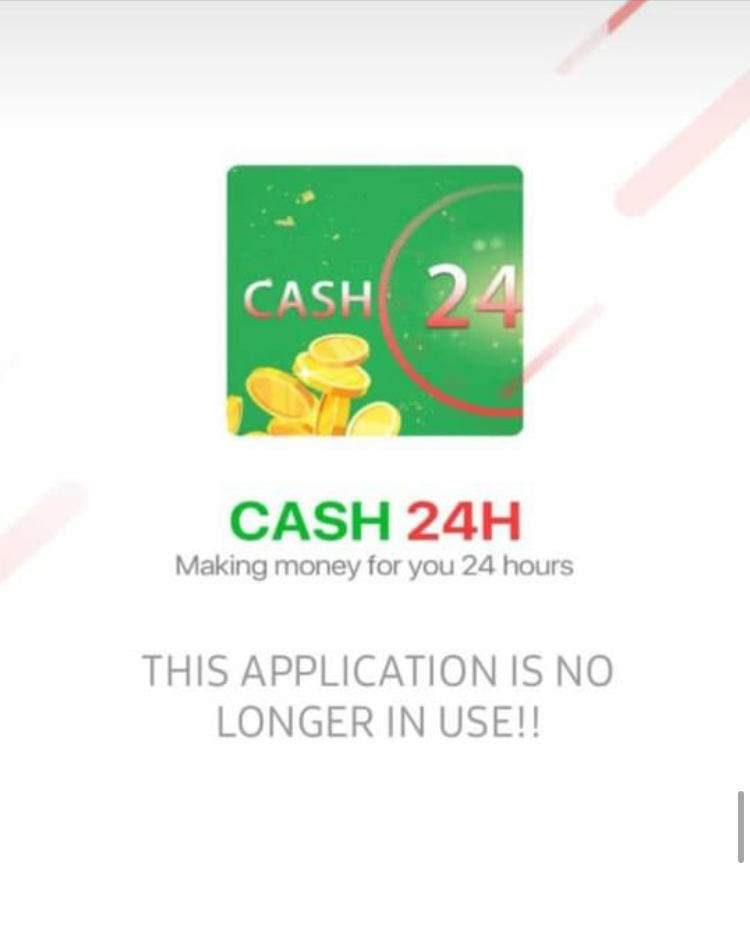Connect with us
Published
3 years agoon
By
Kulan Post
NAIROBI—A Kenyan owned app that promised quick cash has shut down operations abruptly, dashing hopes of thousands of unsuspecting clients who “invested” in the scheme.
Known as “Cash 24” the news of the shut down has been spreading like bushfire with victims sharing their frustrations online.
“I hope it’s not true,” Jane Waweru posted on a Facebook group formed with the intent to furnish the frustrated victims with the latest update. Investors were encouraged to put in cash ranging from sh 600 to sh 50,000. Most of the clients invested in sh 25,000.
Gained fame over the last one month, the app promised steady flow of “profit” while offering the ability to work from home with little hustle.
Some of the victims invested over sh 50,000 as latest as two days ago, just around the same time the app stopped remitting what it referred to as “commission.”
“I received my salary on Sunday. I asked a family member to top up sh 20,000 so that I could join other in making profit from the comfort of my bed,” Abdisalan Hassan, 27, told Kulan Post over the phone.

When the app became a sensation in Nairobi’s Eastleigh, top religious leaders in the area warned against investing in the scheme terming it haram.
“That sort of business is Riba (interest credited from loans or deposits)” said sheikh Mohamed Abdi Umal when a faithful asked him about the state of the frenzy.
The app claimed that it had partnerships with major e-commerce outlets such as Amazon, Jumia and Killmall. It also said that Safaricom’s Mpesa was a partner in the venture.
“We have no relations with the app or any such ventures,” Safaricom told Kulan Post in response to the Cash24 claim.
According to unverified reports, the schemers behind the app amassed over sh 16 million from the unsuspecting investors.
Investors used to received their payment through an Mpesa agent outlet named as Kivaa Ventures Kenya Limited located in the Eastern region.
So, how did the app worked like?
The app was basically an online Ponzi scheme. This is a fraudulent investing scam which generates returns for earlier investors with money taken from later investors. This is similar to a pyramid scheme in that both are based on using new investors’ funds to pay the earlier backers.
The scheme is named after Charles Ponzi, born Carlo Pietro Giovanni Guglielmo Tebaldo Ponzi on March 3, 1882. He was an Italian swindler and con artist in the U.S. and Canada. He died in 1949.
The scheme leads victims to believe that profits are coming from legitimate business activity such as product sales or successful investments, all the while remaining unaware that other investors are the source of funds.
A Ponzi scheme can maintain the illusion of a sustainable business as long as new investors contribute new funds, and as long as most of the investors do not demand full repayment and still believe in the non-existent assets they are purported to own.
What’s the difference between “Pyramid Scheme” and “Ponzi Scheme”
A pyramid scheme is structured so that the initial schemer must recruit other investors who will continue to recruit other investors, and those investors will then continue to recruit additional investors, and so on.
Sometimes,there will be an incentive that is presented as an investment opportunity, such as the right to sell a particular product. Each investor pays the person who recruited them for the chance to sell this item. The recipient must share the proceeds with those at the higher levels of the pyramid structure.
Ponzi schemes, on the other hand, are based on fraudulent investment management services—basically, investors contribute money to the “portfolio manager” who promises them a high return, and then when those investors want their money back, they are paid out with the incoming funds contributed by later investors.
The person organizing this type of fraud is in charge of controlling the entire operation; they merely transfer funds from one client to another and forgo any real investment activities.


8 more people test positive for Coronavirus in Kenya as toll hit 50


40 couples to tie the knot in Mombasa mass wedding


Uhuru send Matiang’i to meet with Ethiopian PM over row with Somalia


President Farmajo accept invitation to meet President Uhuru in Nairobi


Leaders from Nep hail e-learning solution to address teachers crisis


Names of the 8 Northeastern MPs detained at Wilson
